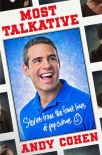Most Talkative: Stories From the Front Lines of Pop Culture by Andy Cohen (read people like a book .txt) 📗

- Author: Andy Cohen
Book online «Most Talkative: Stories From the Front Lines of Pop Culture by Andy Cohen (read people like a book .txt) 📗». Author Andy Cohen
The media were—no surprise—having a field day, and they grabbed on to what I consider to be the easiest hook they could: that reality TV had killed Russell Armstrong. The man was in serious financial trouble, and his business associate killed himself within twenty-four hours of Armstrong’s passing, but according to HLN, I had blood on my hands. As we at Bravo internally debated about how to proceed, we said very little to the press other than the truth: that we were discussing all options relating to the show. I guess that was too boring to believe, because there was a massive amount of misinformation being reported and re-reported: that I was doing an hour-long interview with Taylor about the suicide, that we were filming a special suicide episode of the show, that we were or were not airing specific scenes involving Armstrong. Armstrong’s family spoke out, pinning the blame on Bravo, then saying he’d been murdered, and then indirectly implicating Lisa Vanderpump.
The life of a Housewife is fraught with myriad small crises—from a costar’s household staff making fun of her on-camera to a castmate’s accusations on Twitter about plastic surgery—but here was a major crisis to put all others in perspective. The women were being attacked from all sides and they were scared—they didn’t want their reputations to be ruined or the show to be blamed, and all desperately wanted to do the right thing. The problem was, Emily Post never wrote any instructions on how to handle this kind of situation.
Evolution Media called a meeting with the women at Adrienne’s house. Within minutes, the press got word of the “emergency meeting” that would determine the fate of the show. In fact, its purpose was to calm the hysteria. At Adrienne’s house, the conversation veered all over the place. These women are insiders. They’re plugged into your TMZs and Radar Onlines and have friends at the LAPD, all of whom were floating multiple conspiracy theories. Some said it was murder, others that he had committed suicide because he was hiding a gay lover, another that he was in Brazil, alive and escaped. The women wondered why news of the business partner committing suicide wasn’t being reported; they felt it explained the depth of financial ruin Russell faced. They knew that he’d left a suitcase full of unpaid bills next to his body. Some of the women said that the Armstrongs had passed themselves off as people of means for years to enhance their image; it wasn’t just for the show. Despite how terrible they felt for Taylor and Kennedy, they all felt that nothing anyone had done or not done could have changed the decision that Russell Armstrong had made to end his life. Nonetheless, Lisa thought the show should be delayed. Camille thought it shouldn’t air at all—she’d been the one to out Russell’s physical abuse on the show.
I reached out to Taylor every way I could, but never heard back. Alex Baskin spoke with her many times and she was adamant that every scene be shown, that if people were really going to understand what happened, and connect with the story and maybe make a change in their own life if necessary, they’d need to see all the events as they happened. She didn’t want to keep silent anymore.
My mother, of course, was very upset and kept sending me press clippings and editorials. “What are you going to DO?” she pleaded. “I will watch it, but will anyone else?” As for me, I was having a hard time seeing the forest for the trees, worried that the outrage in the media was too loud for anyone to watch the series without being disturbed by the noise. My colleagues were more levelheaded.
Finally we decided, as we had with the Salahi scandal, to move forward and let the show speak for itself. If people could tune out the tabloid noise, they would see a very raw, real documentary about a circle of women trying to figure out how to help a friend who was in danger and who was going—by her own admission—off the rails. But we knew we had to be very sensitive—the press was all too ready to accuse us of exploitation no matter what we did, but we were mostly concerned with how our audience would feel. We wouldn’t use any scenes including Russell Armstrong to promote the show, and we edited out scenes with him in the early episodes, feeling that it was wrong to show him so soon after the suicide. We cut small mentions of Russell. We cut lines that weren’t funny anymore or that took on a new meaning, like Adrienne saying, “I could kill my husband, he bugs me so much.” We cut a scene in the season premiere of Taylor lingerie-shopping and a friend noting that her husband would die when he saw her in a certain outfit. There was a scene in the third episode illustrating how cold Russell and Taylor’s marriage was, and we cut it. He did eventually appear, though, and the reason was that we felt we’d do him a greater disservice by cutting him out entirely—you humanize him by seeing him instead of just hearing that he’s a bad guy. In the end, what we had, unfolding throughout the season’s twenty episodes, was an honest depiction





Comments (0)